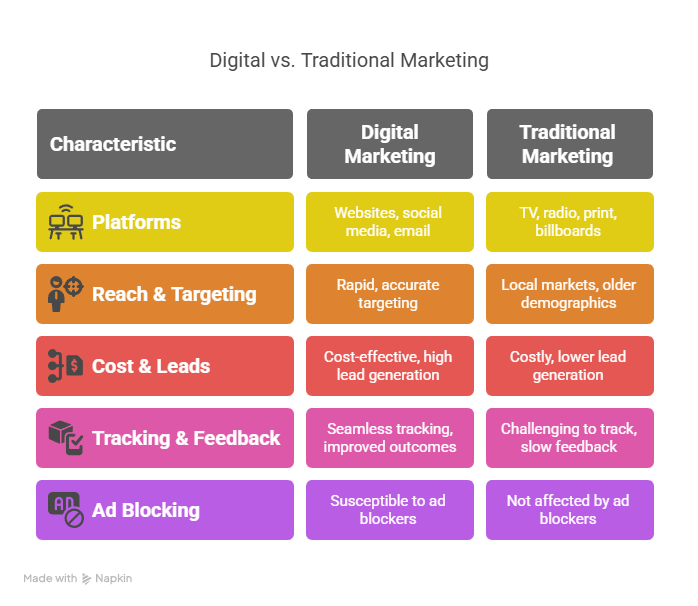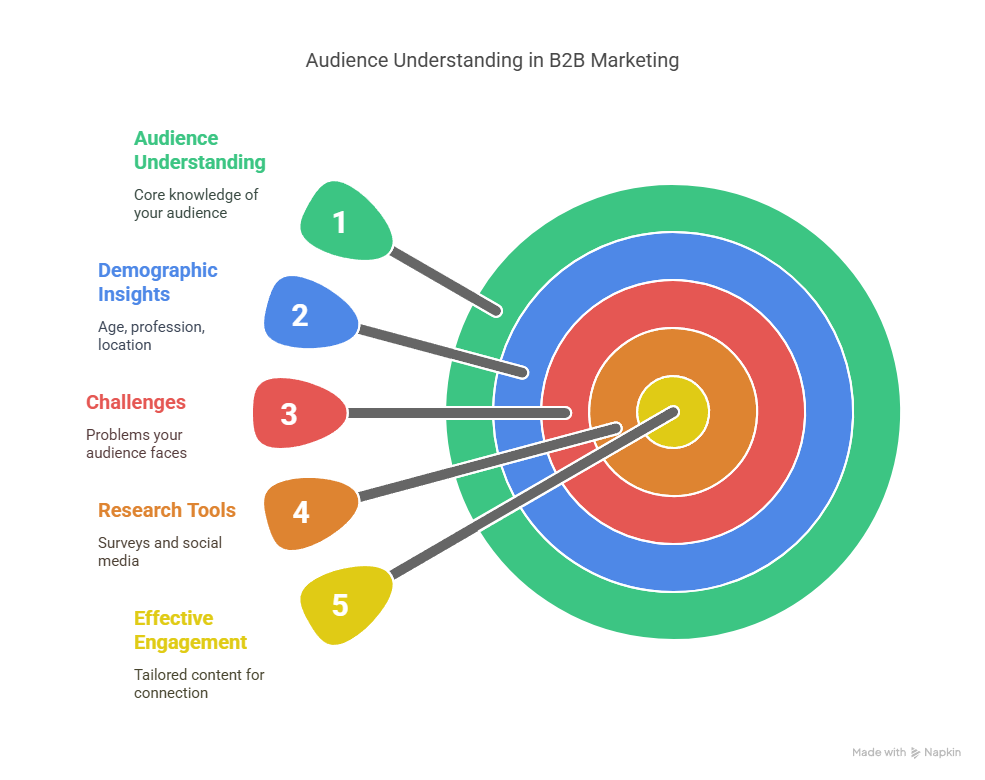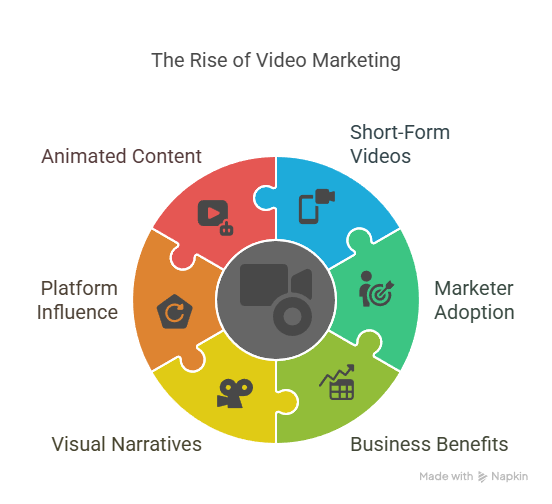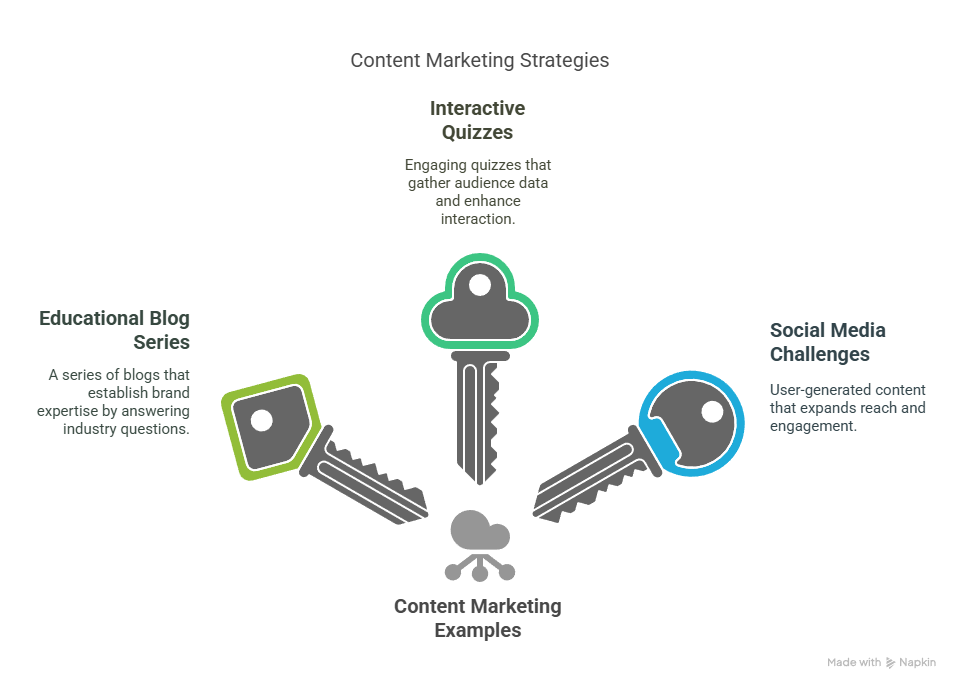Marketing and content connect businesses to people by providing meaningful information that adds value. Customised strategies are key to achieving strong outcomes. Inbound marketing uses stories to attract, while outbound methods spread messages outward.

Both approaches can be effective, but producing worthwhile content often leads to stronger interactions.
Content plays a role in every stage of interacting with the customer. It catches attention during Awareness, provides details at Consideration, and establishes confidence at Decision stages.
Social media platforms help distribute this content broadly with impressive returns on investment. Video production is significant in 2023 as captivating videos reach wider audiences and have longevity through adaptable usage.
The Essence of Marketing in Today’s Digital Age
Marketing has evolved significantly over the years. It now centres on leveraging online tools to engage with audiences and expand brands.
The evolution of marketing strategies
Old marketing relied on ads in papers, TVs, and radios. These methods pushed messages to the masses but lacked personal connection.
Modern strategies focus on digital platforms like social media and websites. Tailored messaging now reaches specific groups based on interests or online behaviour.
Digital vs. Traditional marketing: A comparative analysis

Digital marketing utilises online platforms such as websites, social media, and email. Traditional marketing depends on TV, radio, print advertisements, and billboards. Digital techniques enable rapid outreach to millions and support accurate targeting.
Over 290 million individuals use ad blockers on desktops, diminishing the effectiveness of digital advertisements.
Traditional methods are costly but remain effective for local markets or older demographics. However, strategic content creation produces 3x more leads than outbound advertising and is 62% more cost-effective (Demand Metric).
Digital approaches allow for seamless tracking and improved outcomes, while traditional tactics face challenges with instant feedback.
What is Content Marketing?
Content marketing shares valuable, engaging, or beneficial information to attract and retain an audience. It focuses on fostering trust and delivering meaningful value for prospective customers.
Defining content marketing
Publishing text and visuals online highlights a brand effectively. This marketing technique emphasises blog posts, videos, ebooks, web pages, and infographics. Its goal is to attract potential customers by addressing their interests rather than prioritising direct sales.
The emphasis remains on producing meaningful material that caters to the audience’s requirements.
Poor-quality work fails to deliver results in this realm. Well-crafted articles or striking visuals make a lasting impact instead. This strategy fosters trust while maintaining audience attention for extended periods.
The role of content in digital marketing strategies
Content shapes how brands connect with people. It helps tell stories, share ideas, and build trust. Buyers often engage with 3–5 content pieces before choosing a vendor. This shows how important meaningful and valuable materials are for customer interaction.
Brands like Alex and Leila Hormozi use vast resources on content creation to save millions on ads. They produce 160 pieces monthly with £70,000 spent—this drives online promotion without reliance on heavy ad costs.
Effective marketing strategies depend significantly on thoughtfully crafted content to capture attention and encourage interaction across platforms like social media or websites.
The Power of Content in Marketing
Exceptional content captures attention and maintains audience interest. It fosters trust, promotes engagement, and strengthens the connection between brands and individuals.
How content drives engagement and conversions
Good content captures attention. Articles educate and provide value. Over 70% of people prefer learning about products through articles rather than advertisements. This fosters trust and keeps audiences interested.
Effective writing increases results as well. Businesses implementing intelligent content strategies experienced success—67% of B2B marketers reported it supported lead generation in 2023.
Clear messages direct readers to act, transforming interest into sales or leads.
The impact of quality content on SEO
Exceptional content enhances online visibility. Over 85% of blog traffic originates from organic search, showcasing its effectiveness. Search engines prioritise well-crafted and relevant content with keywords like “SEO impact” and “digital marketing”.
Inferior content underperforms in rankings. About 96% of all content receives no organic traffic (Ahrefs 2023). Producing informative, keyword-focused pieces improves your site’s potential to excel in search results.
Strategies for Effective Content Marketing
Understand your audience before you create anything. Customise material to engage profoundly and maintain their attention.

Identifying your target audience
Define who your audience is. Consider their age, profession, location, and challenges they encounter. Use tools like surveys or social media to collect insights about them.
Over 68% of B2B buyers conduct their own online research. This highlights the importance of understanding your audience to connect with them effectively. Customise content to meet their needs and preferences in a clear and targeted manner.
Crafting compelling content that resonates
Focus on your target audience. Speak directly to their needs, interests, and problems. Use real examples or clear steps that make sense to them. Strong messaging connects emotionally and addresses issues without unnecessary complexity.
Add value by being clear and innovative. Provide useful tips, engaging stories, or step-by-step solutions for better understanding. Sharing knowledge through blogs, social media posts, and videos can enhance interaction when done effectively.
Proceed with tools that make this process more manageable in the next section.
Tools and Platforms for Content Marketing
Use tools to structure and distribute your content more effectively. Platforms like these can assist in expanding your reach and optimising your time.
Overview of content management systems
Content management systems (CMS) assist in organising and sharing material online. They make building websites easier, even for individuals without technical expertise. Tools such as WordPress allow simple uploading of text, images, and videos.
HubSpot Academy offers free resources to help utilise CMS efficiently in marketing initiatives. These platforms enhance marketing approaches by simplifying actions like editing and scheduling posts.
For visual media projects, Canva connects smoothly with various CMS tools.
Leveraging social media for content distribution
Social media platforms provide excellent opportunities to share content. Facebook and Instagram generate a significant return on investment (29%), followed by YouTube at 26% and TikTok at 24%.
These figures showcase the benefits of utilising these channels. TikTok is particularly notable, as 56% of marketers aim to dedicate more resources to it.
Leveraging social media marketing tools streamlines this process. These tools assist in planning posts, analysing user behaviour, and evaluating performance. Prioritising platforms that align with your audience’s preferences leads to improved outcomes.
Sharing on social media effectively expands reach quickly while maintaining cost efficiency.
Measuring the Success of Your Content Marketing Efforts
Monitor how your content is performing to understand its effectiveness. Utilise insights to enhance and strategise your future actions.
Key metrics to track and analyse
Track website traffic to evaluate effectiveness. Analyse bounce rates to determine if content maintains visitor interest.
Monitor SEO rankings for targeted keywords. Australian businesses report content marketing delivers 14% ROI, highlighting its importance. Pay attention to conversions and leads generated from blog posts or campaigns.
Using analytics to refine your content strategy
Use Google Analytics to evaluate the effectiveness of your content. Regularly review tracking metrics and audience interaction details. Tools like HubSpot also assist in assessing performance concerning sales targets or revenue growth goals.
Concentrate on data evaluation to refine content planning. Identify areas for improvement in marketing strategy by examining campaign performance reports. Make changes based on important statistics, such as the number of interactions or shares each post receives.
Challenges in Content Marketing and How to Overcome Them
Content marketing can face hurdles, like staying relevant while trends shift fast. Prioritise reliability and flexibility to address these issues effectively.
Keeping up with changing algorithms
Algorithms change often, affecting visibility on search engines and social media. These shifts can influence SEO strategies, ranking sites lower if not updated. For example, Google’s algorithm updates in 2023 focused more on helpful content and user experience.
Remain proactive by observing industry patterns and responding swiftly. Utilise analytics tools to evaluate performance after adjustments. Concentrate on developing exceptional content that resonates with users while maintaining flexibility in your social media strategy.
This guarantees you remain relevant despite algorithm changes—leading to the next challenge: consistently delivering outstanding content.
Creating consistently high-quality content
Creating consistently outstanding material enhances brand reliability. Informative and educational resources demonstrate authority within the industry. Audiences appreciate straightforward, meaningful insights that address their needs or queries.
Crafting exceptional material increases trustworthiness and helps a business differentiate itself.
Upholding superior standards demands dedication but yields benefits. Resilient and dependable material fosters a credible impression. This leadership garners increased interest and reinforces commitment over time.
Let’s now delve into emerging trends influencing content marketing approaches….
Future Trends in Content Marketing
Videos are becoming a major focus, attracting more viewers and keeping them interested for extended periods. AI tools now assist in creating tailored content more efficiently and with enhanced precision.
The growing importance of video content

Short-form videos are becoming increasingly popular. In 2025, 30% of marketers aim to include them in their strategies. Businesses have experienced positive outcomes with video marketing.
It strengthens relationships and improves profitability.
Approximately 91% of companies incorporate visual narratives today. Video production delivers captivating material that sustains interest for extended periods. Platforms such as TikTok and YouTube drive this expansion.
Animated content also appeals strongly to younger generations.
Personalisation and AI in content creation
AI assists in crafting dynamic and customised content. Over 45% of marketers now utilise AI to produce tailored materials. Bespoke emails, blogs, and ads adjust seamlessly to user preferences.
Interactive tools driven by AI foster stronger connections. Automated systems recommend topics based on patterns such as visual and mobile-optimised designs. This enhances relevance and ensures content remains up-to-date—setting the stage for case studies!
Case Studies: Successful Content Marketing Campaigns
Smart campaigns use narrative techniques to connect with people. These examples demonstrate how inventive strategies can achieve tangible outcomes.
Analysis of campaigns that hit the mark
Chipotle succeeded brilliantly on TikTok. Their campaigns attracted over 2.3 million followers, inspiring enjoyable and relatable trends. This enhanced brand recognition and maintained audience interest with inventive online content.
HubSpot performed exceptionally by utilising blogs to draw in millions of visitors monthly. Their approach combined valuable content creation and strong branding, enabling them to achieve a commanding online presence while captivating their target audience.
Lessons learnt from these successes
Strong branding connects with the audience. Glossier shows this by using Instagram to align content with its brand identity. Their simple yet bold posts draw attention and maintain follower interest.
Videos can create massive excitement when done well. Dollar Shave Club’s humorous video strategy is a great example. It combined wit and clear messaging, leading to rapid growth for the brand.
Strategic content creation like this highlights the impact of great storytelling in marketing campaigns.
Learn More About Content Marketing
Content marketing utilises blogs, videos, and infographics to build connections with people. It generates more than three times the amount of leads compared to outbound strategies.
In 2023, over half of marketers aimed to produce even more materials.
Videos excel in this area. They simplify complex concepts quickly and are ideal for product demonstrations or testimonials. Social media platforms streamline sharing this content in a straightforward and impactful way.
Well-defined plans lead to improved audience interaction and enhanced lead generation outcomes!
Comparison Table: Digital Marketing vs. Content Marketing
Digital marketing encompasses a range of strategies, while content marketing delves into crafting compelling narratives and offering value. The comparison table below outlines significant distinctions to assist you in determining the most suitable method for your objectives.
Key differences and synergies
Content marketing focuses on creating and sharing valuable material. This includes blogs, videos, or social media posts. It helps build trust and solve problems without directly selling.
On the other hand, online marketing uses various techniques like email marketing or pay-per-click advertising to promote products or services quickly.
Both work well when combined. Content supports search engine optimisation (SEO) by boosting visibility with well-crafted material. Marketing ensures this content reaches the right people through tools like social media distribution or collaborations with key individuals.
Together, they generate 3x more leads at 62% less cost compared to traditional methods in 2025.
Social Media Marketing and Content Marketing Examples That Work
Content marketing is the backbone of modern social media marketing. Whether you’re a business owner looking to grow your reach or a marketing professional eager to maximise returns, understanding content marketing strategies and their applications is crucial. This blog will delve into practical content marketing examples, explain why this strategy is essential, and highlight how MaxBiz can help you implement a winning marketing plan.
Outline
- What is Content Marketing, and Why Does It Work?
- What Types of Content Are Most Effective?
- How Do Content Marketing Examples Demonstrate Success?
- Why is Content Marketing Important for Your Brand?
- The Role of Social Media in Content Marketing
- Best Practices for B2B Content Marketing
- Key Marketing Statistics to Keep in Mind
- How to Develop a Solid Content Marketing Plan
- What is the Right Content Format for Your Audience?
- How Content Marketing Can Help Boost Brand Awareness
What is Content Marketing, and Why Does It Work?
Content marketing involves creating and sharing valuable, relevant, and consistent content to attract and retain a target audience. It works because it builds trust, demonstrates expertise, and fosters brand awareness.
Unlike direct advertising, content marketing strategies focus on long-term engagement by providing solutions to your audience’s pain points. Businesses like MaxBiz specialise in helping brands deliver educational content and resources that genuinely resonate.
What Types of Content Are Most Effective?
There’s no one-size-fits-all when it comes to content. The type of content that works best depends on your goals and audience. Here are some common forms:
| Type of Content | Best Use | Examples |
|---|---|---|
| Blogs | Building authority | “10 Tips for Social Media Success” |
| Videos | Engaging storytelling | Product demos, tutorials |
| Infographics | Sharing data visually | Marketing statistics |
| E-books and Whitepapers | Generating leads | Industry reports |
| Social Media Posts | Driving quick engagement | Behind-the-scenes updates |
By selecting the right content format, you can effectively communicate your brand’s message and drive audience engagement.
How Do Content Marketing Examples Demonstrate Success?

Here are a few content marketing examples that stand out:
- Educational Blog Series: A series of blogs answering common industry questions can position your brand as an expert in the field.
- Interactive Quizzes: Quizzes not only engage your audience but also help you collect useful data.
- Social Media Challenges: Encouraging user-generated content can exponentially expand your reach.
These examples show that creating a piece of content tailored to your audience’s interests can yield significant results.
Why is Content Marketing Important for Your Brand?
The importance of content marketing cannot be overstated. It:
- Builds Trust: Providing valuable, relevant information fosters a loyal audience.
- Boosts SEO: High-quality, optimised content improves your website’s search engine ranking.
- Drives Conversions: Content designed to address specific pain points can lead to increased sales.
According to the Content Marketing Institute, businesses that invest in consistent content creation see higher engagement and return on investment.
The Role of Social Media in Content Marketing
Social media platforms are powerful tools for distributing and promoting your content marketing initiatives. They allow you to:
- Publish Content Consistently: A content calendar ensures your posts are timely and relevant.
- Promote Your Content Effectively: Use targeted ads or organic campaigns to reach your desired audience.
- Engage with Your Audience: Real-time interactions build stronger customer relationships.
Platforms like Instagram and LinkedIn are ideal for sharing long-form content and related content to attract leads and maintain visibility.
Best Practices for B2B Content Marketing
B2B content marketing requires a more strategic approach, focusing on building relationships and providing high-value information. Here are some tips:
- Create Content That Educates: E-books and case studies resonate well with B2B audiences.
- Use Content Marketing to Solve Problems: Address industry challenges to demonstrate your expertise.
- Collaborate with Industry Influencers: Partnering with thought leaders can amplify your reach.
Key Marketing Statistics to Keep in Mind
Let’s look at some marketing statistics that underline the value of content marketing:
- 72% of marketers say content marketing increases engagement and leads.
- Blogs generate 67% more leads than companies without blogs.
- Companies using video see a 54% increase in brand awareness.
These numbers reinforce the need for a solid content marketing plan.
How to Develop a Solid Content Marketing Plan
A content marketing plan is your roadmap to success. Here’s how to create one:
- Define Your Goals: Are you looking to increase traffic, generate leads, or build brand loyalty?
- Identify Your Audience: Understand their preferences, pain points, and behaviours.
- Select the Right Type of Content: Choose formats that align with your objectives.
- Allocate Resources: Build a skilled marketing team or partner with experts like MaxBiz.
What is the Right Content Format for Your Audience?
Choosing the right content format is crucial. For example:
- Use videos for high engagement and storytelling.
- Create infographics for visual learners.
- Publish blogs to improve SEO and attract organic traffic.
Experimenting with different forms of content can help you discover what resonates best with your audience.
How Content Marketing Can Help Boost Brand Awareness
Content marketing is one of the most effective ways to build and sustain brand awareness. Through high-quality, consistent content, you can:
- Attract New Audiences: Reach potential customers by addressing their needs.
- Retain Existing Customers: Keep your audience engaged with valuable updates.
- Differentiate Your Brand: Stand out by offering unique and excellent content.
Businesses like MaxBiz specialise in creating targeted campaigns that help brands thrive in competitive markets.
Summary of Key Takeaways
- Content marketing is essential for building brand awareness and driving engagement.
- Different types of content serve unique purposes; choose formats that align with your goals.
- A strategic content marketing plan ensures consistent, measurable progress.
- Social media is an indispensable tool for distributing and amplifying your message.
- Partner with experts like MaxBiz to maximise your content’s impact and reach.
Start creating content that drives results today with MaxBiz—where strategy meets execution!
Conclusion
Marketing and content complement each other effectively. Captivating narratives attract audiences, while well-thought-out plans convert them into customers. Concentrate on delivering value to those who are essential to your business.
With the appropriate tools and dedication, you can accomplish enduring progress. Begin creating today—success is attainable!
Summarising the critical role of content in marketing
Content shapes how brands connect with people. Over 70% of consumers prefer learning about products through articles rather than ads, showing a shift in consumer preference. Well-crafted material enhances SEO strategies and leads to better search rankings.
Strong content also improves brand visibility, drawing attention and building trust.
Content marketing generates three times more leads than outbound methods while costing less. Video production increases audience interaction, with 91% of businesses using it to improve action rates.
Focused efforts on valuable information keep users informed and interested, leading to success in inbound marketing campaigns.
Final thoughts on harnessing the power of content for marketing success
Strong content connects brands to people. It helps businesses stand out and build trust. Video marketing simplifies ideas, drawing in more viewers. Social media enhances customer interaction and strengthens community bonds.
Customised, clear content aligns with every phase of the customer experience. This enhances audience reach, optimises conversions, and boosts brand visibility. Engaging material now delivers better leads than ads at reduced costs for maximum effect.
To dive deeper into the world of content marketing and unlock its full potential, explore our comprehensive guide here.
FAQs
1. What is marketing and content?
Marketing and content work together to promote brands, share ideas, and connect with audiences using clear messages.
2. Why is good content important in marketing?
Good content grabs attention, builds trust, and helps businesses stand out from competitors.
3. How do you create strong marketing content?
Focus on your audience’s needs—use simple words, tell a story, and keep the message clear.
4. Can all types of businesses benefit from content marketing?
Yes! From small shops to big companies—it works for anyone wanting to grow their customer base.






